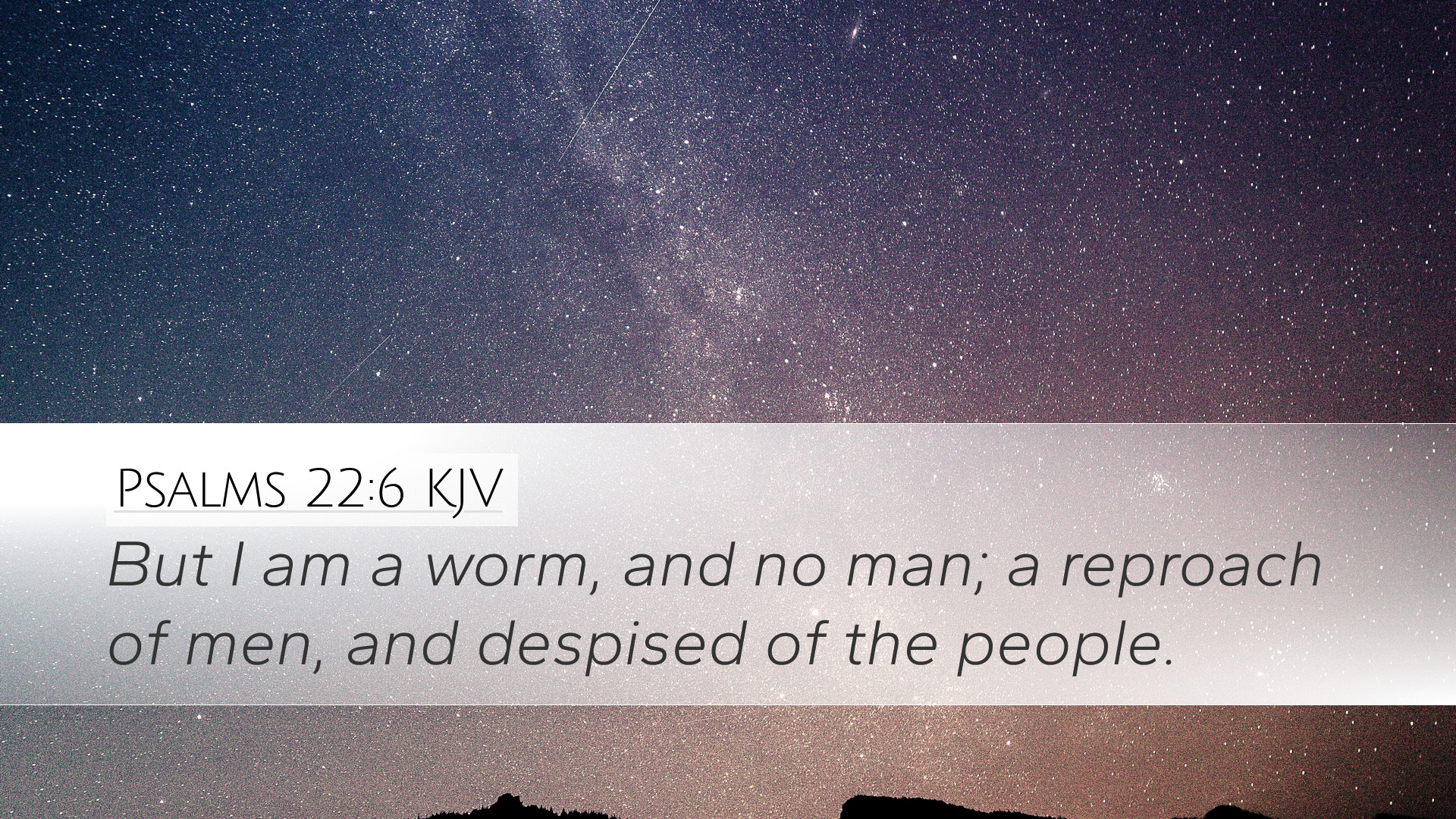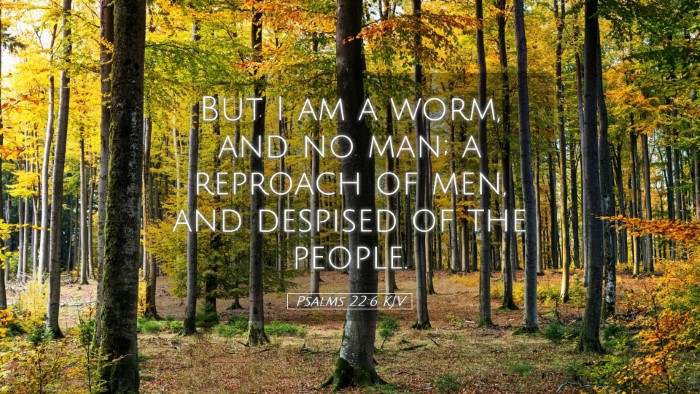Psalms 22:6 Commentary
Psalms 22:6 states, "But I am a worm and not a man, scorned by mankind and despised by the people." This verse forms a crucial part of a psalm that profoundly expresses feelings of abandonment and isolation. David, the psalmist, through vivid imagery, reveals the depth of his emotional and spiritual plight.
This passage, rich in theological implications, has been examined deeply by various scholars throughout history. Below, we summarize insights from notable public domain commentaries, including those by Matthew Henry, Albert Barnes, and Adam Clarke.
1. Contextual Background
Psalms 22 is often interpreted within the context of David's own sufferings, but it also serves as a prophetic glimpse into the anguish of Christ during His crucifixion. The opening lines evoke the sense of abandonment felt by Jesus, as He quotes from this very psalm on the cross. Understanding this context is fundamental to interpreting verse 6 fully.
2. Exegesis of "I am a worm and not a man"
Matthew Henry emphasizes the humility encapsulated in the term "worm." He notes that the worm symbolizes insignificance and degradation compared to humanity. The psalmist uses this metaphor to articulate profound suffering and the feeling of worthlessness under the weight of both physical torment and social scorn. David is expressing a state of being that is devoid of esteem and recognition, reflecting how deep personal trials can make one feel diminutive and marginalized.
Albert Barnes further elaborates on this metaphor, explaining that the use of "worm" reflects not just a personal lament but also the universal condition of humiliation. Barnes notes that the imagery illustrates how the psalmist feels utterly abandoned, stripped of dignity, and subjected to mockery, reminiscent of Christ’s own experience before His accusers. This motif of being dehumanized highlights the shame and suffering inherent in persecution.
Adam Clarke contributes to this discourse by focusing on the connotations of worthlessness associated with the term "worm." He adds that the worm is often seen as the lowest of creatures, which correlates to the psalmist's feeling of being scorned and despised. Clarke's perspective underscores the psychological anguish accompanying such brutal feelings of rejection and despair.
3. Scorned by Mankind
The second part of the verse states that the psalmist is "scorned by mankind and despised by the people." This highlights the social isolation that accompanies intense personal suffering.
- Matthew Henry explains that this scorn encompasses a broad range of ridicule, indicating not just the psalmist's personal pain but also how society often marginalizes those who suffer. He posits that such experiences can lead to a deep crisis of faith, as the afflicted may feel distanced from God and His comfort.
- Albert Barnes brings attention to the collective aspect of this disdain, where the scorn extends beyond individual encounters to a societal phenomenon. He notes that when one is rejected by society, it can intensify feelings of isolation and despair, echoing the treatment of Christ during His passion.
- Adam Clarke focuses on the emotional ramifications of being despised, noting that the rejection by peers can deeply affect one’s self-worth and faith. He suggests that such experiences are not only trials but can serve as profound moments for spiritual reflection and growth.
4. Theological Implications
This verse serves as an essential linkage between the Old and New Testaments. Both Henry and Barnes highlight how the sentiments expressed here are echoed in the New Testament, particularly in the life and suffering of Jesus Christ.
Matthew Henry argues that understanding this psalm elevates the reader's grasp of Christ's suffering—His identification with humanity's lowest points. This interpretation invites believers to see their own trials reflected in Christ's agony, fostering a deeper connection to their Savior.
Albert Barnes articulates this idea further by positing that the desolation expressed in Psalms 22 can therefore be a source of comfort for believers. When facing their own trials, they can find solace in knowing that Christ has shared in extreme suffering and humiliation.
Adam Clarke adds a pastoral note, suggesting that such laments are crucial in the life of a believer. They encourage authenticity in one's relationship with God, showcasing that despair need not be hidden but brought before Him in trust and hope for restoration.
5. Conclusion
Psalms 22:6 encapsulates the anguish of feeling like an outcast, parallels the suffering of Christ, and reveals fundamental truths about human despair and divine empathy. For pastors and theologians, this verse is a profound reminder of the importance of connection, acknowledging suffering as a shared human experience. The insights derived from these timeless commentaries provide layers of understanding that inspire faithfulness amid trials.
As we reflect on this scripture, may it serve to deepen our understanding of suffering, inspire compassion in ministry, and encourage a profound reliance on the God who understands our pain.


